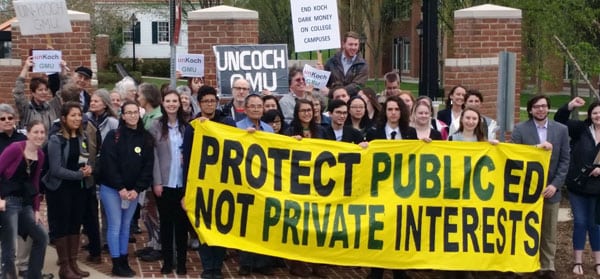
July 6, 2018; Chronicle of Higher Education and Washington Post
According to a recent ruling from a Virginia Circuit Court judge, a foundation whose sole purpose is to support a state-sponsored university is not a public body and so is exempt from meeting the requirements of the state’s open records statutes.
The ruling came in a suit brought in 2016 by a George Mason University student group, Transparent GMU, which posed the question of properly balancing the public’s right to know with donors’ privacy rights. Specifically, the suit challenged the common practice of using a closely aligned but legally independent foundation as a fundraising mechanism that can keep the specifics of donor agreements private.
George Mason University has been in the middle of an ongoing controversy about improper donor influence at public universities that NPQ has been following closely. Back in February 2017, Ruth McCambridge wrote:
As readers may recall, it was a 2016 donation from this foundation that renamed GMU’s law school after the late Antonin Scalia, an issue that provoked much resistance from students and faculty. A donation from the same foundation caused controversy at Florida State University, where the Tampa Bay Times alleged that an agreement allowed the Koch Foundation to “screen and sign off on any hires” for the two new programs and to “withdraw its funding if…not happy” with the faculty who are hired or if they “don’t meet ‘objectives’ set by Koch during annual evaluations.”
The ability of supporting foundations to hide these kinds of requirements was the impetus for the Transparent GMU suit.
Open records advocates should note that Judge John M. Tran’s ruling emphasized that the Foundation’s ability to keep its records private did not extend to the university itself: “This decision does not mean that the university has unfettered right to keep secret its use of gifted funds to create programs in compliance with conditions and restrictions imposed upon those gifts.”
According to the Chronicle of Higher Education, “the judge noted that, when it comes to donations with strings attached, those gifts could become public records once they are accepted and used by the university. That’s because George Mason has a gift-acceptance committee composed largely of senior university officials. The committee’s work, he wrote, is not exempt from the state’s Freedom of Information Act.”
In welcoming the decision, Jay O’Brien, chairman of the George Mason University Foundation, issued a statement that recognized the need to protect the integrity of the University from undue donor influence. “We believe this ruling affirms…that our donors have certain rights, including privacy, associated with their gifts. This does not however mean that this foundation or George Mason University, who we so proudly support, should ever relinquish its academic integrity.”
Sign up for our free newsletters
Subscribe to NPQ's newsletters to have our top stories delivered directly to your inbox.
By signing up, you agree to our privacy policy and terms of use, and to receive messages from NPQ and our partners.
GMU’s recent history shows the importance of public scrutiny of the demands of donors. As NPQ reported earlier this year, only the public disclosure of previously secret agreements forced the university’s administration to take steps to protect academic freedom.
According to the Washington Post, the university’s president, Angel Cabrera, recognized in an email to the university community that “some gift agreements…raise questions concerning donor influence in academic matters. The agreements did not give donors control over academic decisions, and all but the earliest of these agreements explicitly stated that the final say in all faculty appointments lies in university procedures. Yet these agreements fall short of the standards of academic independence I expect any gift to meet.”
Once these requirements were in the open, the University was forced to change its gift acceptance policies to increase protections against undue influence.
Judge Tran’s ruling was based on Virginia state law, which, he concluded, recognizes the Foundation, despite its close ties to the university, as a private organization and not a public institution. He directed those who wanted more transparency from the Foundation to seek legislative change.
From state to state, the legal status of these closely aligned foundations varies, and according to the Chronicle of Higher Education, “the ruling does little to clarify an already-cloudy legal picture.”
Little consensus exists on the reporting obligations of university foundations. States like California have put laws in place that subject those foundations to open-records requests. Other states, like Connecticut, have laws exempting foundations. The question has divided state courts.
Samantha Parsons, a George Mason alumna who co-founded Transparent GMU, told the Chronicle, “We’ve successfully galvanized a national conversation about transparency and about the relationship private donors have with universities.”
It is an important conversation that needs to continue. Donors have a right to their personal agendas and their desire to fulfill their visions through their resources. But they need to ask to do their work in the open. The public has the right to understand what their institutions are giving in return for the gifts they agree to receive. For even the most generous donor, that should not be too much to ask.—Martin Levine













